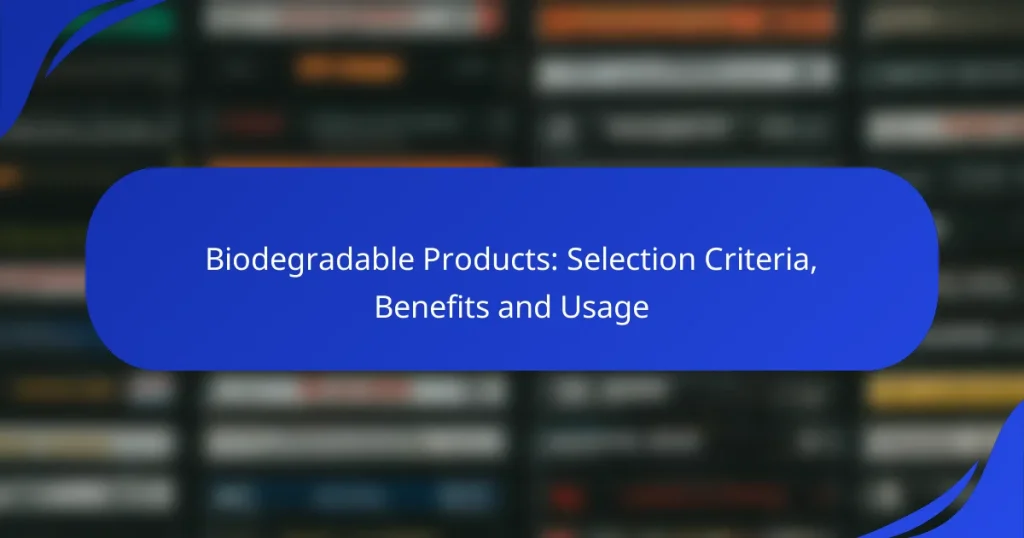
Biodegradable Products: Selection Criteria, Benefits and Usage
Biodegradable products are designed to decompose naturally through microbial action, significantly reducing waste and environmental…
Embracing eco-friendly home goods is a vital step towards sustainable living, as these products are crafted from renewable resources, recycled materials, and organic fabrics. By opting for items that prioritize longevity and biodegradability, consumers can significantly reduce their environmental footprint while creating healthier living spaces. Making the switch not only benefits the planet but also enhances personal well-being and can lead to cost savings over time.
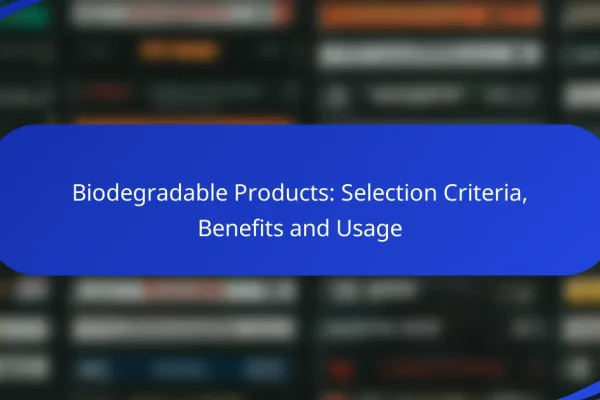
Biodegradable products are designed to decompose naturally through microbial action, significantly reducing waste and environmental impact. By choosing these sustainable alternatives, consumers can help minimize pollution and promote a healthier ecosystem. When selecting biodegradable items, it’s essential to consider their materials, certifications, and effectiveness in breaking down in the environment. What are biodegradable products? Biodegradable…
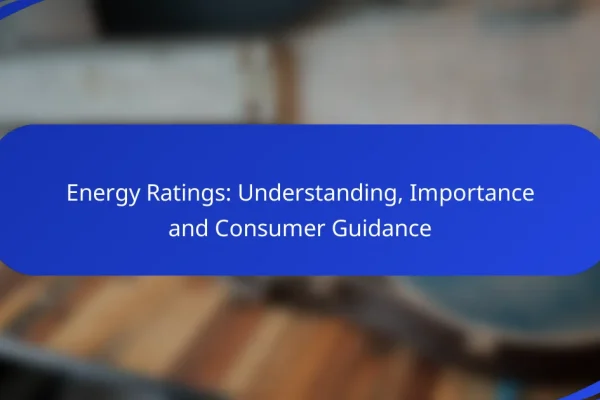
Energy ratings play a vital role in guiding consumer choices by offering clear insights into the energy efficiency of various products and appliances. By understanding these ratings, consumers can make informed decisions that not only lead to cost savings but also contribute to a more sustainable environment. How do energy ratings impact consumer choices? Energy…

Biodegradable product certifications play a crucial role in assuring consumers that the items they purchase are environmentally friendly and will decompose effectively. By adhering to established standards such as ASTM D6868 and FTC guidelines, these certifications promote transparency and accountability, ensuring that products meet specific criteria for biodegradability and compostability. What are the top biodegradable…
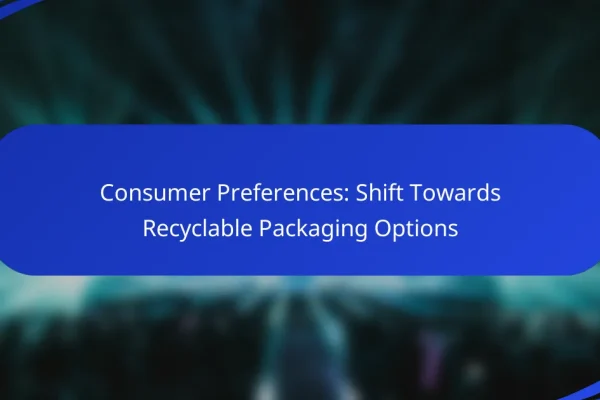
As consumer awareness of environmental issues continues to rise, there is a notable shift towards recyclable packaging options in the marketplace. This growing preference not only encourages brands to adopt sustainable practices but also drives innovation in packaging solutions, such as biodegradable mailers and plant-based plastics. By prioritizing eco-friendly materials, companies can meet the demands…
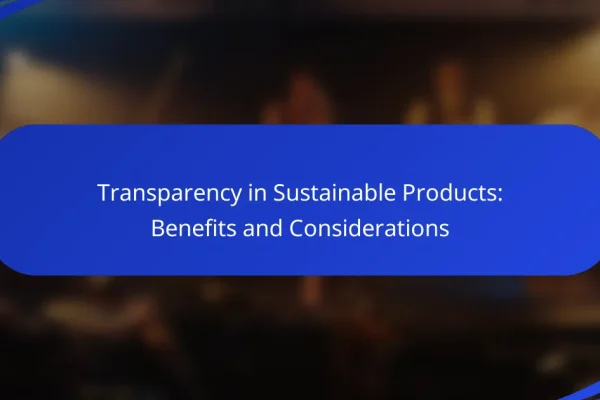
Transparency in sustainable products is essential for building trust and accountability between consumers and brands. By openly sharing details about sourcing, production processes, and environmental impact, companies can enhance their reputation and attract conscientious customers. This clarity significantly influences purchasing decisions, as informed consumers are more likely to choose products that align with their values….
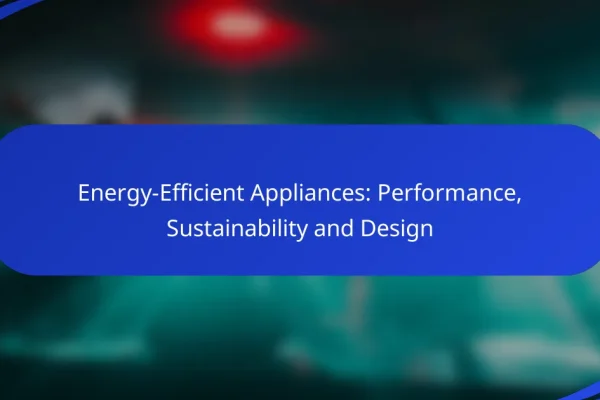
Energy-efficient appliances are designed to minimize energy consumption while maximizing performance, making them an essential choice for environmentally conscious consumers. By opting for models such as Energy Star certified refrigerators and high-efficiency washing machines, households can significantly reduce utility bills and contribute to a more sustainable future. These innovations not only lower monthly expenses but…
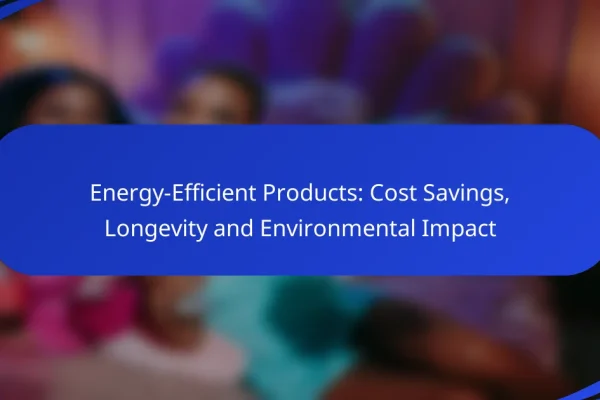
Energy-efficient products are designed to minimize energy consumption, resulting in substantial cost savings on utility bills and potential tax incentives. By incorporating items such as Energy Star appliances and LED lighting, consumers can enjoy both longevity and reduced environmental impact, contributing to a more sustainable future. These products not only save money but also play…

Supply chain transparency is essential for consumers seeking to understand the origins and journey of the products they purchase. By providing insights into sourcing, manufacturing, and delivery processes, it empowers individuals to make informed decisions that align with their values and safety standards. Brands that prioritize transparency foster trust and enable consumers to choose ethically…
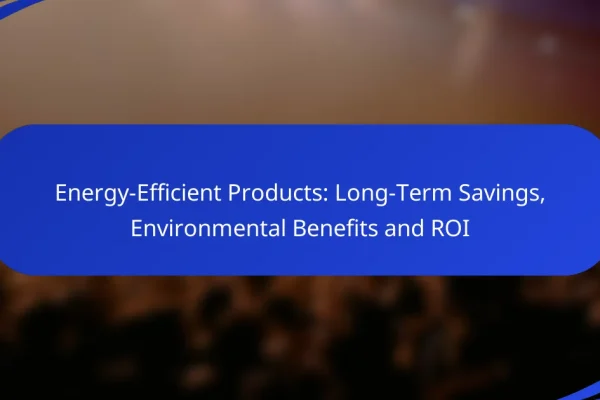
Investing in energy-efficient products, such as LED light bulbs, Energy Star appliances, and smart thermostats, can lead to substantial long-term savings and environmental benefits. By reducing energy consumption, these products not only lower utility bills but also help decrease greenhouse gas emissions, promoting a healthier planet. Embracing energy efficiency is a smart choice for both…

Ethical brands are redefining consumer relationships by prioritizing transparency and accountability, which in turn builds trust. By openly communicating their sourcing and production practices, brands like Patagonia, Everlane, and TOMS create a reliable connection with their customers, fostering loyalty and promoting social responsibility. Choosing to shop from these brands not only enhances the consumer experience…
The best eco-friendly home goods for sustainable living include products made from renewable resources, recycled materials, and organic fabrics. These items not only reduce environmental impact but also promote healthier living spaces.
Bamboo kitchenware is a popular choice due to its sustainability and durability. Bamboo grows rapidly and requires minimal resources, making it an eco-friendly alternative to plastic or traditional wood products.
When selecting bamboo kitchenware, look for items that are certified organic and free from harmful chemicals. Popular options include cutting boards, utensils, and bowls that can last for years with proper care.
Recycled glass storage containers are an excellent way to reduce plastic waste in your home. These containers are made from repurposed glass, which helps decrease landfill contributions and energy consumption associated with new glass production.
Consider using these containers for food storage, meal prep, or organizing household items. They are typically dishwasher-safe and can withstand high temperatures, making them a practical choice for eco-conscious consumers.
Organic cotton bedding is produced without synthetic pesticides or fertilizers, making it a healthier option for both you and the environment. This type of bedding is soft, breathable, and often hypoallergenic, promoting better sleep quality.
When purchasing organic cotton bedding, look for certifications such as GOTS (Global Organic Textile Standard) to ensure the product meets stringent environmental and social criteria. Investing in high-quality organic cotton sheets can enhance your comfort while supporting sustainable practices.
Compostable dishware is designed to break down naturally in composting environments, reducing plastic waste significantly. These products are typically made from materials like sugarcane, bamboo, or palm leaves, providing an eco-friendly alternative for parties and events.
When using compostable dishware, ensure that it is disposed of in a composting facility or home compost pile to achieve its environmental benefits. This option is ideal for those looking to minimize their ecological footprint during gatherings.
Biodegradable cleaning products are formulated to break down safely in the environment, unlike conventional cleaners that may contain harmful chemicals. These eco-friendly options are effective at cleaning while being safer for both users and aquatic life.
When choosing biodegradable cleaning products, look for labels that specify they are free from phosphates, sulfates, and synthetic fragrances. Brands that offer refillable options can further reduce waste and promote sustainable consumption practices.
Eco-friendly home goods significantly reduce waste by promoting sustainable practices that minimize reliance on disposable products. By choosing items designed for longevity and biodegradability, consumers can lower their environmental impact and contribute to a circular economy.
Reusable products are essential in cutting down on single-use waste, which contributes heavily to landfills. Items such as stainless steel water bottles, cloth shopping bags, and silicone food storage bags can replace their disposable counterparts, effectively reducing the amount of plastic and other materials that end up in waste streams.
When selecting reusable products, consider durability and ease of cleaning. For example, a high-quality stainless steel bottle can last for years, while a cotton tote bag can be used hundreds of times. This not only saves money in the long run but also significantly decreases waste generation.
Compostable items are designed to decompose naturally, returning nutrients to the soil and reducing landfill waste. Products like compostable plates, utensils, and bags are made from organic materials that break down in composting environments, unlike traditional plastics that can take centuries to decompose.
To effectively use compostable items, ensure they are disposed of in the right conditions, such as a compost bin that maintains adequate heat and moisture. This process can take anywhere from a few weeks to several months, depending on the material and composting method. Always check for certifications like ASTM D6400 to ensure the product meets compostability standards.
Using sustainable home goods offers numerous advantages, including improved health, reduced environmental impact, and potential cost savings. These products are designed to be eco-friendly, often made from natural materials that minimize harm to both people and the planet.
Sustainable home goods often contain fewer harmful chemicals compared to conventional products. For instance, organic textiles and low-VOC (volatile organic compounds) paints can significantly enhance indoor air quality, reducing allergens and irritants.
Choosing items like natural cleaning supplies and furniture made from sustainable materials can help create a healthier living environment. Look for certifications like Green Seal or Greenguard to ensure products meet stringent health standards.
Opting for sustainable home goods contributes to a lower carbon footprint. These products are typically made from renewable resources, which helps conserve natural habitats and reduces waste in landfills.
For example, bamboo furniture grows quickly and requires less water than traditional hardwoods. Additionally, many sustainable goods are designed for durability, meaning they last longer and reduce the need for frequent replacements.
While sustainable home goods may have a higher upfront cost, they often lead to significant savings in the long run. Energy-efficient appliances, for instance, can lower utility bills by reducing energy consumption.
Investing in quality, sustainable items means fewer replacements and repairs, which can save money over time. Consider budgeting for these purchases as a long-term investment in both your home and the environment.
You can find eco-friendly home goods in various places across the USA, including online retailers, local stores, and farmers' markets. Each option offers unique benefits and a range of sustainable products to choose from.
Online retailers such as Grove Collaborative specialize in eco-friendly home goods, providing a convenient way to shop for sustainable products. They often offer a subscription model, allowing customers to receive regular shipments of household essentials that are environmentally friendly.
When shopping online, look for retailers that provide clear information about their sourcing and sustainability practices. Many platforms also offer customer reviews, which can help you make informed decisions about the products you choose.
Local eco-friendly stores are excellent places to find sustainable home goods while supporting your community. These shops often curate a selection of products that align with environmentally responsible practices, such as zero-waste items and organic materials.
Visiting local stores allows you to see and feel products before purchasing, which can enhance your shopping experience. Additionally, many local shops host events or workshops that promote sustainable living, providing further opportunities to engage with eco-friendly practices.
Farmers' markets often feature vendors who sell eco-friendly home goods alongside fresh produce. These markets can be a treasure trove of sustainable products, including handmade soaps, reusable bags, and organic cleaning supplies.
When visiting farmers' markets, take the time to talk to vendors about their products and sourcing methods. This direct interaction can provide valuable insights into the sustainability of the items you are considering, helping you make more informed choices.
When selecting eco-friendly products, consider their environmental impact, sustainability of materials, and certifications that verify their eco-friendliness. Look for products that minimize waste, use renewable resources, and have a transparent supply chain.
Material sourcing is crucial in determining the sustainability of home goods. Products made from recycled, organic, or sustainably harvested materials tend to have a lower environmental footprint. Certifications such as FSC (Forest Stewardship Council) for wood products or GOTS (Global Organic Textile Standard) for textiles can help identify truly eco-friendly options.
When evaluating certifications, check for reputable labels that indicate compliance with environmental standards. This can include certifications for energy efficiency, low emissions, or fair trade practices. Understanding these labels can guide you in making informed choices that align with your sustainability goals.
Be cautious of greenwashing, where products are marketed as eco-friendly without substantial evidence. Always research the claims made by manufacturers and look for third-party certifications that validate their environmental benefits. This diligence ensures you invest in products that genuinely contribute to sustainable living.